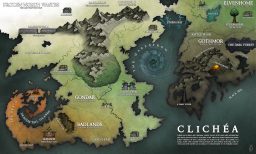 Author and game designer James Cambias explains why he uses a home-brewed alternative to the official setting of his preferred role-playing system:
Author and game designer James Cambias explains why he uses a home-brewed alternative to the official setting of his preferred role-playing system:
Why use a fantastical Earth rather than a made-up world? Two reasons: laziness and obsessive attention to detail.
Laziness means I can let Google Maps, the CIA Factbook, and Wikipedia do my world-building for me. Look up a place, look up who lived there around 1600 (the approximate date of the campaign), look up what religion they followed before converting to Christianity or Islam (if they ever did), maybe check one of those “Ten Things to See In X Place” travel articles for some local color or ideas, and voila! Prep work is done. I don’t have to spend time reading up on the imaginary history of a game setting, because I’ve already spent forty-five years reading up on the history of the Earth.
Obsessive attention to detail means I don’t have to think about questions like “Why does this fantasy setting in an alternate universe have humans in it?” or “Why do they have made-up gods but use real names of demons and monsters from Terrestrial folklore?” or “Why do these made-up cultures look so much like historical ones except for some annoying concessions to 21st-century sensibilities?”
See, I actually think about things like that, and they bug me. (I guess I side with Tolkein rather than Lewis in that respect.) I want my imaginary game world to hold together, which means I want to know why their human cultures and races manage to fall into patterns from Earth’s history, despite radically different geography and history.
Why does this sort of thing work well in practice when the masterpiece of world-building that the other guy is selling you tends to be a pain to put into actual play…?
Game Mastering takes a tremendous amount of brain power to manage. Adding in the burden of having to portray someone else’s elaborately detailed game setting in a consistent manner takes a lot of energy for very little return. If the players are already familiar with that setting via a range of “official” products that you may not even have, suddenly every off-the-cuff decision the Game Master makes regarding what is going on and why is liable to be cross-examined by smarmy-pants players. Do people manage to work around this sort of thing and have fun anyway? Sure. But it really is a buzzkill you don’t have to subject yourself to.
If I’m shelling out hard earned cash for a role-playing game product, I want it to solve problems that get in the way of the fun. Not make it harder! That’s why a homebrew setting like what James Cambias is doing is a great idea. You don’t just have complete freedom to throw in anything that strikes you as being awesome. You can also revise major premises in the course of play in response to the actual needs of the campaign and in response what the players bring to the table. That’s a double synergy that multiplies the fun and frees the Game Master to throw himself into a game with no limits.
Role-playing has more in common with an open jam at a jazz club than chamber music. For the best results, your approach to setting needs to reflect that.
“…just use Earth, you big baby.” -Kenneth Hite, to me, in good humor, about worldbuilding
That’s what I did, essentially. I never used somebody else’s world. I used maps of the real world and then frankensteined them with fictional stuff I liked, like Prydain and Barsoom. My players seemed to love it. I used that world for all my campaigns for 15yrs. Some player drove 40mi one way for marathon weekends. They must’ve liked it.
Using the real world as a reference helps head off a lot of the silliness seen (at least, I see it) in RPG worlds like Dragonlance and Forgotten Realms.